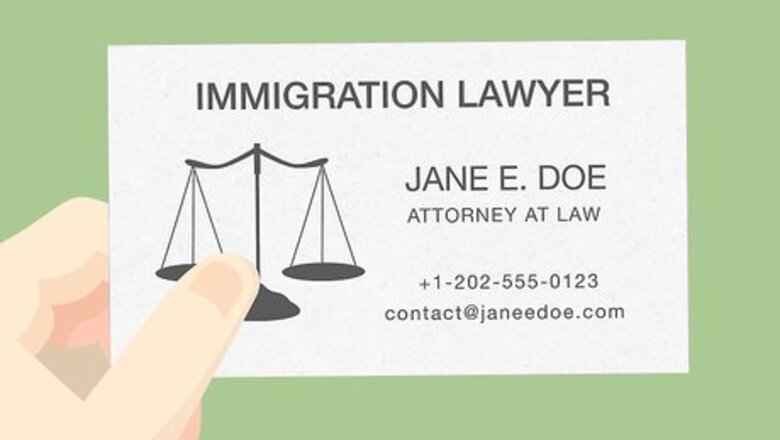
views
X
Research source
Submitting a Petition
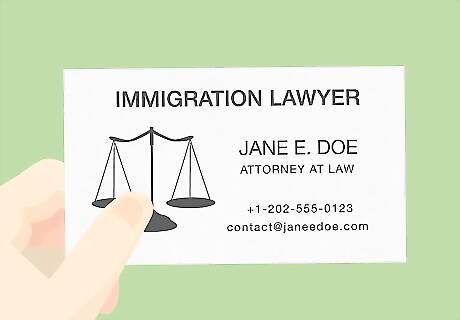
Consider hiring an attorney. The immigration application process is complex, and many of the forms can be confusing. An experienced immigration attorney in the U.S. can facilitate the process for you and make sure all documents are correctly filled out and filed. Look for an attorney who is a member of the American Immigration Lawyers' Association, a professional organization for experienced attorneys who specialize in immigration law. You also should make sure you check the record of any attorney you're considering hiring with the state bar association in the state where he or she is licensed. Make sure the attorney is reputable and has no significant complaints or disciplinary records. You should be able to have a free consultation with several attorneys so you can find out what they can do for you and observe their demeanor and the way they treat their clients. All immigration cases are different, so you also should make sure the lawyer has experience handling your type of application. For example, if you plan to immigrate to the U.S. because you have a job offer, you probably don't want to use an attorney who specializes in fiancé immigration applications. If you're concerned about your ability to afford an attorney, you may be able to find free or reduced-cost representation through a nonprofit immigration organization or other legal aid society. The Immigration Advocates Network has a nationwide list of these organizations available at http://www.immigrationlawhelp.org.
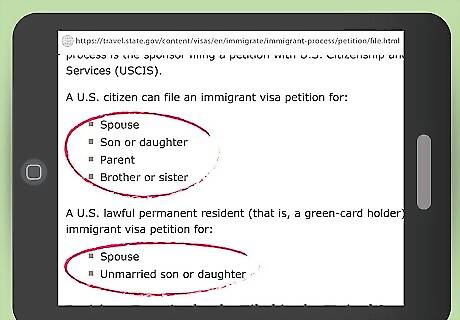
Choose a sponsor. Typically your sponsor will be a U.S. citizen who is your spouse, parent, child, or sibling. Lawful permanent residents also can serve as sponsors for their spouses or unmarried children. Your sponsor also may be your employer, if you are applying for immigration because you have a job in the U.S. All sponsors must be over the age of 18 and live in the U.S. or in any of the U.S. territories or possessions, either as a citizen, a U.S. national, or a lawful permanent resident.
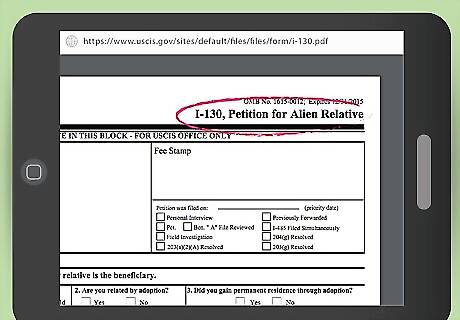
Have your sponsor complete the appropriate form. Relative sponsors must complete Form I-130, while employer sponsors must complete Form I-140. Your sponsor can download Form I-130 and instructions from the U.S. Citizenship and Immigration Services website at http://www.uscis.gov/i-130. Employer sponsors can download Form I-140 and instructions from the USCIS website at http://www.uscis.gov/i-140.
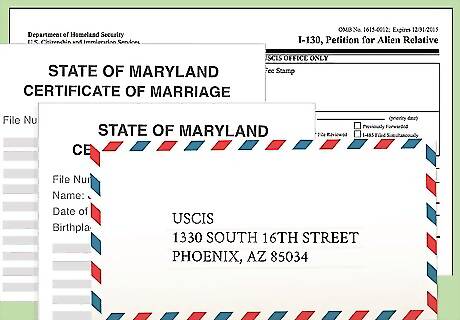
File the petition with the USCIS. Your sponsor must file the petition on your behalf at the appropriate USCIS processing location by mailing it using the U.S. Postal Service. The USCIS has two Lockbox facilities for filing Form I-130. Whether your sponsor must file the petition at the Phoenix location or the Chicago location depends on the state in which he or she lives. Form I-130 must be accompanied by a $420 filing fee. Where your sponsor files Form I-140 depends on whether he or she is filing the form by itself, or with other forms. Form I-140 must be accompanied by a $580 filing fee.
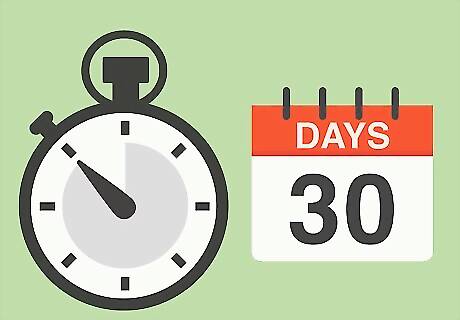
Wait for USCIS approval. It may take up to 30 days for the USCIS to process your petition and send your notice of approval. Once your petition is approved, it will be sent to the Department of State's National Visa Center. Even if the USCIS approves your visa petition, it may take several months or even years before you get a visa number and the NVC begins processing your application. This is because U.S. law limits the number of immigrant visas available each year depending on your immigrant category and your country of citizenship. For example, if your sponsor is your spouse, parent, or adult child, it should take a minimal amount of time to proceed to the next step because immigrant visas are not limited in these categories. This is because U.S. immigration policy prioritizes family unification. If your application falls into any other category, you must check your priority date to find out how long you will have to wait for your visa. The NVC has a priority date checker available on its website. After your petition is approved, you will receive a welcome letter from the NVC that includes your NVC case number, beneficiary ID number, and invoice ID number. Keep this information in a safe place, because you will need these numbers to complete the application process.
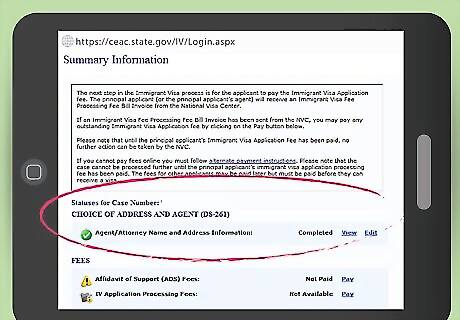
Choose an agent. Your agent is the person who receives information and notices from the NVC regarding your immigration application. You may act as your own agent. However, you may want to choose your petitioner/sponsor, another family member, or your attorney. Regardless of who you choose to act as your agent, you must complete a DS-261 form to let the USCIS and the NVC know of your choice – even if you plan to act as your own agent. This form is available at the Department of State's Consular Electronic Application Center (CEAC), which you can access at https://ceac.state.gov/IV/Login.aspx by entering your case number. Once you've submitted Form DS-261, it may take as many as 15 days for the NVC to process it and add the information to your case file.

Pay your processing fees. After you choose your agent, you must pay the processing fees for your immigrant visa application and your affidavit of support. The total amount you must pay will be listed on the invoice you received with your NVC welcome letter. That amount varies depending on your immigrant category and other factors. For example, you must pay $325 to process an I-130 petition and $120 for an affidavit of support review. The quickest way to pay your fees is online; however, you must have a checking or savings account at a U.S. bank to pay online. To make a payment, you must enter the routing number and account number for that account. If you have access to a U.S. bank account, you can access the Department of State's Immigration Visa Invoice Payment Center at https://ceac.state.gov/CTRAC/Invoice/signon.aspx. You must have the NVC case number and invoice ID number from your NVC welcome letter to login to that system. It may take up to five days to process online payments. If you don't have a U.S. bank account, you can pay by mail with a cashier's check or money order made out to the U.S. Department of State for the amount listed on your fee invoices. Write your NVC case number on the memo line of the cashier's check or money order and mail it along with the invoice itself to NVC Fee Processing Center, P.O. Box 790136, St. Louis, MO 63179-0136. Keep in mind that if you pay your fees by mail rather than online, it will take longer to process your application and move forward to the next step. The NVC will notify you when your payment has been received and processed.
Applying for a Visa
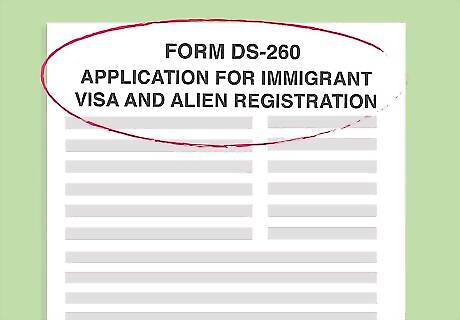
Get a copy of Form DS-260. Titled the Application for Immigrant Visa and Alien Registration, Form DS-260 is the document that initiates your visa application process. Although you can complete and submit the form using the CEAC, you should download a copy of the form before you start filling out so you have an understanding of the information that will be required to complete it. The Department of State has a copy of the form available at https://travel.state.gov/content/dam/visas/DS-260-Exemplar.pdf. If you review the form before you start the process in CEAC, you can gather any information required to complete the form that you don't know off the top of your head.
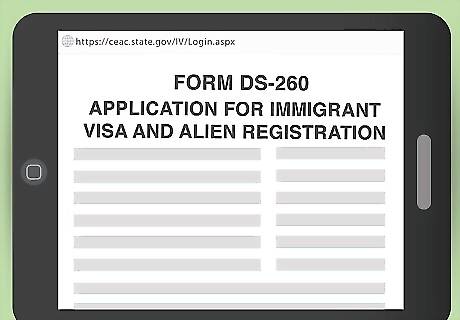
Complete Form DS-260. You must sign in to CEAC using your NVC case number and invoice ID number to begin the process. Once your account loads, you have access to the list of applications included under your case number. If you are the only person immigrating to the U.S., only your name will be listed. However, if your spouse or children also are immigrating, you will all be included under the same case number. Once you start the application, you can save the information you've entered at any point. The system will log you out if there is no activity for 20 minutes and you will lose any unsaved information you've entered. The application requires personal information such as your name and date of birth, marital status, and nationality. You also must enter current and past addresses and employment information. The next portion of the application asks family information such as the names, and dates and places of birth of your parents, spouse, and children. You also must answer questions concerning any previous visits to the U.S., information about your work and education history, the person who filed the petition on your behalf, your medical and health history, criminal background, and other security information. Once you've answered all the questions completely, you can sign the form electronically and submit it to the NVC. A confirmation page will appear when you've successfully submitted your application. You must print this page up and take it to your visa interview.
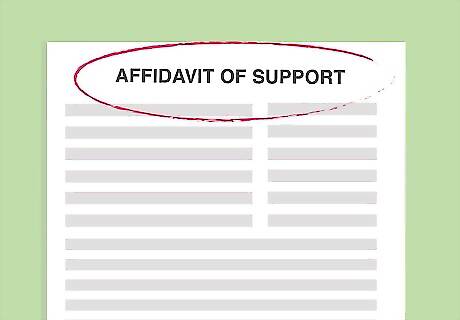
Have your sponsor complete an affidavit of support. The affidavit of support is a legal contract in which your sponsor establishes that he or she has the means to support you financially and promises to do so. In most cases, you must have an affidavit of support before the NVC will continue processing your visa application. Which affidavit of support your sponsor must fill out depends on your immigration category. Along with the affidavit of support, your sponsor also must submit financial evidence that supports the claims he or she made in the affidavit. Typically your sponsor will give the affidavit and supporting documents to you, but in some cases he or she may be instructed by the officer reviewing your case to submit them directly to the NVC.
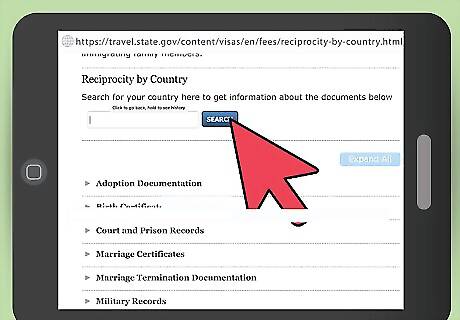
Gather your required civil documents. You must submit documents such as your birth certificate, court and prison records, and any marriage certificates along with your application. All documents must be issued by the appropriate governmental authority in your country. A list of the specific documents required for each country is available at http://travel.state.gov/content/visas/en/fees/reciprocity-by-country.html. The documents must be written in English or in the official language of the country in which you are applying for your visa. Otherwise, you must have the documents translated and include a sworn certification from the translator testifying that he or she is a competent translator and the translation is accurate.
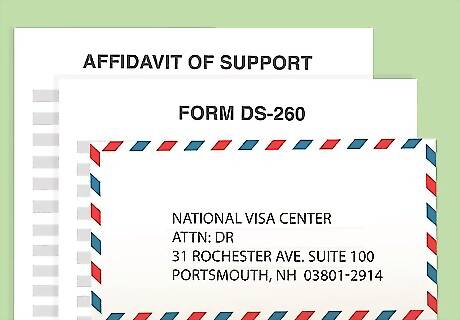
Submit your application and supporting documents. Once you've gathered all required documents, you must submit them in one package to the NVC. You may be able to choose between submitting your documents through email or mailing in paper documents. However, keep in mind that once you choose a method, you can't change your mind and use the other method later. After the NVC receives your documents, it may take up to 30 days for your application to be reviewed.
Attending Your Interview
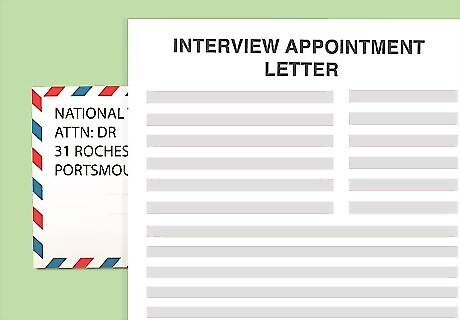
Receive notification of your interview date. After your application is reviewed, if the NVC determines your file is correct it will mail you an interview appointment letter. This letter also will be sent to your sponsor and your agent or attorney, if you have one. Keep in mind you may have to wait several months before there is an appointment time available. In the meantime, the NVC will send your entire file including your petition, application, and supporting documents to the U.S. embassy or consulate where your interview will be held.
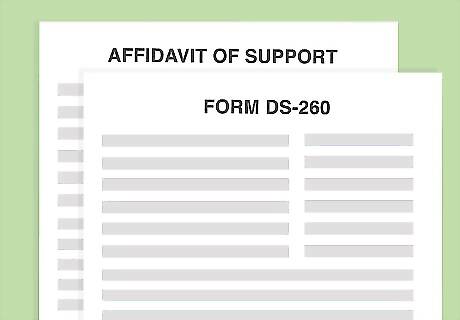
Gather your documents. You must bring originals of all the documents you submitted with your application to your interview. You also must have a copy of each original document you bring with you. Your interview appointment letter may contain additional instructions from the U.S. embassy or consulate where your interview will take place. Review those instructions and gather any information they require. In addition to the documents that you submitted with your application, other documents may be required. The NVC provides a list of documents required for your interview that you can use as a checklist to make sure you have all the documents ready. Organize your documents in a file or folder and keep them secure until the date your interview is scheduled.

Complete a medical exam. You must complete a medical exam with an authorized physician and get any required vaccinations before the date of your interview. In some cases the physician will give you a sealed envelope with your medical report following your exam. Do not open this envelope. Other physicians may send your report directly to the U.S. embassy or consulate where your interview is scheduled. You must take your vaccination immunization records, copies of any prior chest X-rays, and copies of your medical history to your medical exam.
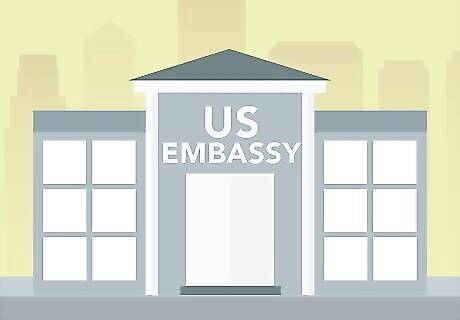
Go to the U.S. embassy or consulate. On the date of your interview, you will meet with a consular officer who will talk to you about your application, review your file, and determine whether to grant you a visa. Make sure you bring all required documents with you along with an unexpired passport that is valid for at least six months beyond the date you intend to enter the U.S. You also must have two identical color photographs of yourself that were taken within the last six months. These photos should be a full-face view of you wearing clothing you wear on a daily basis. Additionally, the photos must meet certain size and quality requirements. If you're unsure if the photos you've had made meet the requirements, seek out a retailer that produces passport photos.
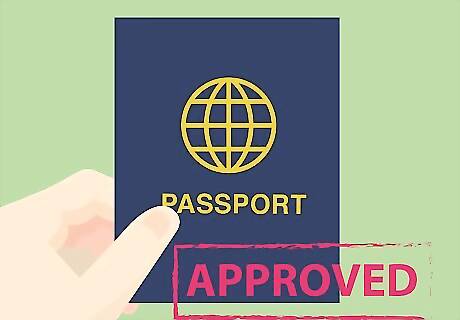
Find out whether your application is approved. At the end of your interview, the officer will tell you if your application has been approved or denied. If your application is approved, you must give your passport to the consular officer. Your passport will be returned with your visa and a sealed immigrant packet for you to present to U.S. Customs and Border Protection upon your arrival. If your visa is denied, the consular officer will explain why you have been deemed ineligible for an immigrant visa. If your application requires additional information or further processing before it can be approved, you will be informed of any further steps you need to take.


















Comments
0 comment